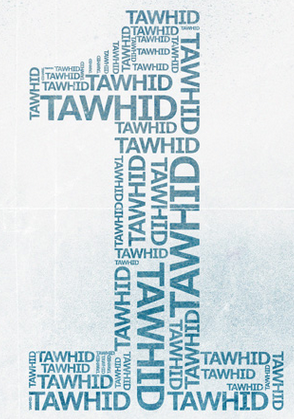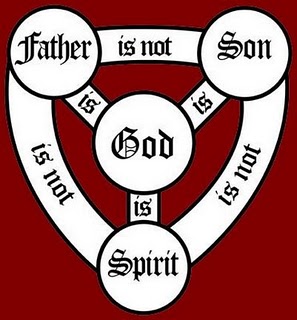 On Tuesday April 4th, 2017 we met for our second session to study Nabeel's book No God But One. We started off with a short quiz then worked through Part 2 and 3 - "Tawhid or the Trinity?" and "Muhammad or Jesus?". (I also realized I went 30 mins over our time. Sorry about that, I forgot our end time!)
On Tuesday April 4th, 2017 we met for our second session to study Nabeel's book No God But One. We started off with a short quiz then worked through Part 2 and 3 - "Tawhid or the Trinity?" and "Muhammad or Jesus?". (I also realized I went 30 mins over our time. Sorry about that, I forgot our end time!)I decided to print out my completed student workbook (blank version here) and gave it out to everyone make taking notes easier. You can download my completed workbook here.
The class was recorded and the video is available here. A written recap summary of the session is provided below.
Our next meeting will be April 18th, 2017, we will not meet next week April 11th, 2017. Hope to see you all there!
Short Quiz
Everyone was given a short 5-question quiz as review of last week's discussions. The questions for the quizzes are going to be on the main topics that will typically be covered in this recap. So if you read this you should be good!Part 2: Tawhid or the Trinity? (Two Different Gods)
Tawhid - A Problem for Allah
 The concept of Tawhid was new to pretty much all of us. Tawhid is the Islamic term for oneness. It is the teaching that Allah is absolutely one. This description of Allah took time to hammer out for early Muslims. In fact, less than 200 years after Muhammad, a 15 year intra-Muslim persecution took place over the oneness (Tawhid) of Allah and how to make sense of the Quran in light of that.
The concept of Tawhid was new to pretty much all of us. Tawhid is the Islamic term for oneness. It is the teaching that Allah is absolutely one. This description of Allah took time to hammer out for early Muslims. In fact, less than 200 years after Muhammad, a 15 year intra-Muslim persecution took place over the oneness (Tawhid) of Allah and how to make sense of the Quran in light of that.The notion of Tawhid, creates a problem for Muslim thinkers. It would seem that Allah cannot have attributes because they would curb his absolute unity, being things he has as opposed to things he is. Similarly, the Quran is understood as Allah's attribute of speech (the Word of Allah). How can the Quran, something other than Allah, exist eternally yet not violate Tawhid. This caused problems.
The Mihna (Islamic Inquisition) aimed at persecution of those who claimed that the Quran was eternal because that would insult Tawhid. The inquisition eventually ended and the problem with understanding the eternality of the Quran, Allah, and Tawhid was "solved." What was the solution? Bila kayf.
Bila kayf means "without how" and simply means there is no rational solution. Ironically the majority of Muslims today believe the very thing that would have gotten them killed during the Mihna - they believe that the Quran is eternal but this doesn't violate Tawhid. When asked how this can be the response is bila kayf.
Trinity - A Solution, Not a Problem (related article)
It's no coincidence that the Quran is known as the Word of God in Islam and Jesus is called the Word of God in the Bible. For Muslims, the expression of Allah in the physical world is the Quran, and for Christians, the expression of Yahweh in the physical world is Jesus. This causes a problem for the unitarian concept of Tawhid in Islam but fits perfectly in the Christian description of God as Trinity.The doctrine of the Trinity teaches that there is one God and that God exists as three persons. There is no contradiction there because person is not the same as being. Being answers the question of "What are you?" (God). Person answers the question of "Who are you?" (Father, Son, Holy Spirit). One being, three persons.
 The Trinity is an understanding of God based on Biblical data. There are 5 truths in the Bible that basically construct the doctrine of the Trinity:
The Trinity is an understanding of God based on Biblical data. There are 5 truths in the Bible that basically construct the doctrine of the Trinity:- There is only one God (e.g., Rom. 3: 30)
- The Father is God (e.g., John 6: 27)
- Jesus is God (e.g., John 20: 28; Rom. 9: 5; 2 Peter 1: 1)
- The Holy Spirit is God (e.g., Acts 5: 3– 5)
- These three are distinct persons (e.g., John 14: 16– 17)
Contrast this to Tawhid. Allah, as absolute unity, is intrinsically removed from people. Characteristics like love and mercy cannot exist in Allah unless Allah creates something to be loving or merciful to.
These concepts of God affect our actions too. In Islam acting selfless and loving is simply because Allah commands it. In Christianity acting selfless and loving is because it is in accord with who God is and who we are being made in the image of God.
So if one asks whether Christians and Muslims worship the same God it should be clear that, by the very nature and understanding of God, that they do not.
Muhammad or Jesus? (Two Different Founders)
Next, we quickly moved to an overview of Muhammad and Jesus.Christians understand Jesus to be God. This was officially stamped at the Council of Nicea in AD 325 but don't think that this was the first time people decided Jesus was God. Everyone at the Council believed Jesus to be divine, the real issue was whether Jesus was one of multiple gods or not.
Islam teaches that Jesus is not divine, though neither is Muhammad, both are considered prophets. Jesus has a very different place in Christianity than Muhammad has in Islam. Deity is distinct from prophethood.
In Christianity Jesus is fully God and fully man. This is what is known as the hypostatic union - Jesus has two natures, human and divine. The natures of Jesus are not either-or. The humanity of Jesus does not diminish his divinity. This helps Christians answer questions like "How can Jesus, as God, be hungry or tired or weep?" The answer is because Jesus has a complete human nature as well.
In Islam, Muhammad is the last and greatest prophet. He is the perfect exemplar, showing people how to live as Allah commands. This is why hadith (the record of Muahmmad's life) is so important. The primary effort of a Muslim is to live as Muhammad did (e.g. growing beards without mustaches, just as Muhammad did).
Christians look to Jesus as humanity's perfect example. But not in the form of particulars (e.g. how to shave) but in the form of heart transformation. Jesus teachings about how to forgive, love, and sacrifice are exalted and followed by Christians. Jesus as fully God took on humanity to die a death for each person, that we might be forgiven. This is the sacrificial example of love that Christians trust, worship, and follow.
Conclusion and Next Time
Much more was discussed so check out the video (or at least audio) of the entire session. We will pick up with "Part 4: Quran or the Bible" and more next time.Our next meeting will be Tuesday April 18th, 2017, 6:30-8pm in the Fellowship Hall (basement) of Mt. Zion UMC. Hope to see you there!


No comments:
Post a Comment